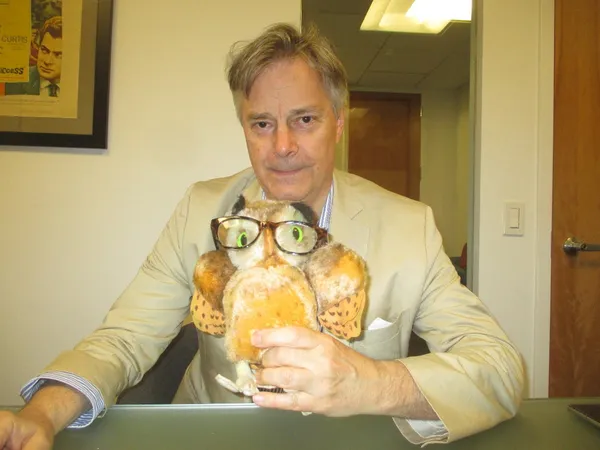On the afternoon before the 20th anniversary screening of The Last Days of Disco, starring Kate Beckinsale and Chloë Sevigny with Chris Eigeman, Matt Keeslar, Robert Sean Leonard, Tara Subkoff, Mackenzie Astin, Matt Ross, Burr Steers, Michael Weatherly, Jaid Barrymore, and Jennifer Beals, at the Film Society of Lincoln Center, Whit Stillman sat down with me for a conversation.
The director of Metropolitan, Barcelona, Damsels In Distress, and Love & Friendship and I speak about the importance of locations, props and Alfred Hitchcock, Christian Kracht's The Dead, Lady And The Tramp in The Last Days Of Disco and the film's costume designer Sarah Edwards (Gary Ross's upcoming Ocean's 8, starring Cate Blanchett, Sandra Bullock, Anne Hathaway, Rihanna, Sarah Paulson, Dakota Fanning, Helena Bonham Carter, Matt Damon).
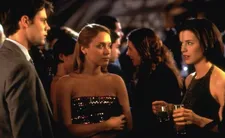 |
| Josh (Matt Keeslar) with Alice (Chloë Sevigny) and Charlotte (Kate Beckinsale) |
At the disco, Kate Beckinsale's character Charlotte talks enthusiastically about taking her seven-year-old niece to see Lady And The Tramp and says: "She loved it. It was so cute." Chloë Sevigny's Alice responds: "I hate that movie."
Charlotte: "What?"
Alice: "It's so tacky. Not to mention depressing."
Charlotte: "A sweet movie about a cute cartoon dog you find depressing?"
Matt Keeslar as Josh agrees with Alice and takes off from there with his critique of the film which ends with the line I quote to Whit at the start of our conversation.
Anne-Katrin Titze: "Films like this program women to adore jerks." [Whit didn't quote the response back to me - "God, you're nuts!" delivered by Chris Eigeman as Des]
Whit Stillman: Yes!
AKT: A character in your film said this about Lady And The Tramp twenty years ago. How do you feel about that now?
WS: Nothing has happened to change that. It's still accurate.
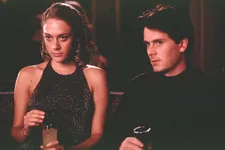 |
| Alice (Chloë Sevigny) with Des (Chris Eigeman) on Lady And The Tramp: "It's so tacky. Not to mention depressing." |
AKT: About that particular film?
WS: About Lady And The Tramp. I'm still against it.
AKT: Anything you put into that film where you now think, how could I ever have said that, thought that?
WS: No, I haven't. The thing is there's a distance between what the characters say and what I might think.
AKT: Obviously.
WS: So they're speaking humorously and they're debating. I like to pretend that I'm the observer of these debates, not a participant.
AKT: Pretend is the word.
WS: Well, I don't comment on matters of public controversy.
AKT: Seeing Last Days Of Disco again, I noticed the clothes. From the first shot you show that the two women are not friends. You can tell by the way they are walking to the club and by what they're wearing.
WS: Good. I didn't notice that aspect of it. The thing is in film you have a lot of people thinking through things and even if you're not thinking it through, you could get the benefit of their analysis of everything. So that was Sarah Edwards, very good costume designer. This is the beginning of her career. She's been very successful designing clothes for films.
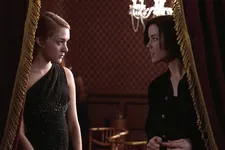 |
| Whit Stillman on Alice (Chloë Sevigny) and Charlotte (Kate Beckinsale) dressed by costume designer Sarah Edwards: "Yeah, they're really different." |
AKT: It is very telling. One of the women wears what looks like a denim jacket, the other one a one shoulder dress.
WS: Yeah, they're really different.
AKT: They are of different worlds and it's beautiful that this is conveyed in one shot, the whole relationship.
WS: Pretty much, yeah, that's true. That is true.
AKT: Seeing your film, The Last Days Of Disco, again after 20 years, it felt like a strange kind of archiving. As if the last two decades of the last century were folding in on each other. The 1980s and 1990s are in this fold in your film.
WS: That's possible.
AKT: Does that make any sense to you?
WS: It does make sense. Yes, because we can't forget what we've learned entirely if we're making a retrospective film. Also in our films that have been looking towards the past - which is pretty much every film - we try not to make them too much period films. We try to act as if they were contemporary films. But just a lot of the aspects are from another period.
AKT: It's a kind of freedom you give yourself, time wise.
WS: Yes. I think when people get too, too, too serious about a certain aspect of period it becomes sort of a formaldehyde situation or a diorama of the past. And there's a very set way now of doing a lot of period films. In Love & Friendship we wanted to avoid this. And it's where they have a street scene and they have all the characters and all the extras and this big scene and then they go inside. We wanted to avoid all those kind of things that are done.
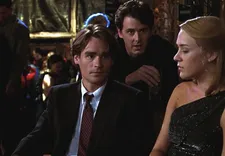 |
| Tom (Robert Sean Leonard) with Des (Chris Eigeman) and Alice (Chloë Sevigny) |
So we did get some criticism because we have a lovely shot of Chloë's character [in The Last Days Of Disco], the Alice character's walk of shame when she's coming out of Tom's (Robert Sean Leonard) apartment. You know, his building in the East 90s near Central Park. And she walks into the street and the camera follows her. And we couldn't really close off 5th Avenue.
So at the very end of the shot there are two cars that pass. They weren't exactly 1997 cars when we were shooting, they were a little bit older. But they weren't 1981 cars. So we had that in the film. But I think it's better to have an actual city, you know, the real city.
AKT: Right.
WS: And it's more false when everything is completely faked.
AKT: I agree. The sense of place and a more visceral time you get of the decades.
WS: When you pick the locations.
AKT: A sense of time where it doesn't matter which time.
WS: The art departments have all kinds of tricks for allowing you to shoot in actual streets. So they have a big truck that looks very old-fashioned. And they park that big truck in front of something that looks totally out. But then you get the whole sweep of the city with the other buildings and all that. And with the city changing all the time, you actually get period benefits really quickly.
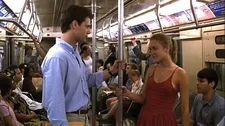 |
| Josh (Matt Keeslar) with Alice (Chloë Sevigny) in a New York City subway car |
When we were shooting Barcelona, TWA airlines still existed and then it failed. So it became like a period detail. One of my favourite moments in Last Days Of Disco is when in the middle of a shot church bells start.
AKT: Outside the subway station downtown. I was going to ask you about that.
WS: Cyrilian church bells started to sound. It's one of the great moments of Chris Eigeman ad libbing to that. Because instead of just ignoring it he actually reacted to it - which was a wonderful moment. And it was actually very hard for us to find actual Cyrilian church bells that sounded right for that. We had the actual thing which wasn't properly recorded so we had to re-do it.
And then a very sad thing. So we shot that in 1997 and in 2001 one of the consequences of the World Trade Center was debris from the World Trade Center fell on the bells and knocked them out. And until very recently there have not been those bells on that beautiful old church.
AKT: In that shot you show the subway station, the 2, 3 line. Everybody who has been in New York around 9/11 will recognise this.
WS: Yes. I don't think we see it in the shot but there's a beautiful old Catholic church right down one block south of there.
AKT: Privacy and the betrayal of privacy is something that's important in your films, isn't it?
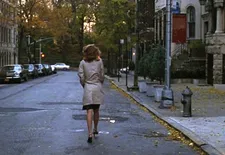 |
| Whit Stillman on Alice's "walk of shame when she's coming out of Tom's apartment.": "We couldn't really close off 5th Avenue." |
WS: Yes, yes.
AKT: That somebody is taking over. When I knew I was going to meet you today, I went into the cedar chest that I have at home and I dug out this [I present to Whit my Steiff owl].
WS: Oh my gosh! It's fantastic! It's much bigger than mine!
AKT: I have the little one too but I couldn't find it.
WS: That's Steiff, right?
AKT: Yes.
WS: I imaginatively named mine Owly. You saw Metropolitan?
AKT: That's why I brought my Owly. That scene in Metropolitan hit me so deeply.
WS: In Germany Steiff is big too, right? It's Swiss, isn't it?
AKT: It's German.
WS: I just love their stuffed animals. This is a huge one.
AKT: I do too. Isn't it beautiful?
 |
| Anne-Katrin Titze's Steiff owl at home without Whit Stillman's glasses: "I just love their stuffed animals. This is a huge one." |
WS: It's fantastic.
AKT: The scene in Metropolitan hit such a chord and not just because of my Owly.
WS: Did your parents throw your things out?
AKT: Some things are gone but I rescued that one. Owly still is with you?
WS: I don't know. The thing is, my father did throw … My father got remarried to someone and they tend to throw out all our stuff. My mother was very good about trying to keep stuff, maybe too good. I've sort of fallen into a pattern where I really haven't had an apartment on my own since I moved out of New York 20 years ago, the weekend Disco opened. So I have so much storage that I have to figure out what to do with.
AKT: And that's where the owl is probably?
WS: I don't know. No, he must be, if he's in the movie! Yeah, I had it then.
AKT: Owls to Athens, I am bringing.
WS: Yes.
AKT: Or to you. That scene in itself represents a total betrayal in that box. You walk on the street and you find your childhood toys abandoned and you cannot even acknowledge that because of the pressures around you. It's one of the most impressive scenes, I think, in your whole oeuvre.
WS: Yes, life gives us these moments.
AKT: You live in Paris, right?
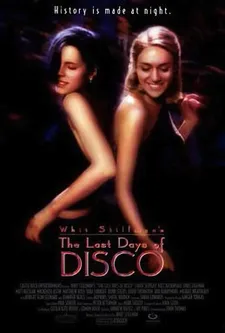 |
| The Last Days Of Disco poster |
WS: I'm pretty much in Paris, yeah.
AKT: I don't know if it came out there, Christian Kracht's new novel The Dead?
WS: His name sounds very familiar. I can't remember.
AKT: Imperium was his last novel. The new one is coming out in English this summer.
WS: Have they made films?
AKT: He wrote the screenplay together with his wife Frauke Finsterwalder for the film she directed, called Finsterworld. Anyway, near the end of his novel The Dead, there is a scene that takes place in the old Hollywood.
An aspiring actress comes back to her home after some horrible incidents that she barely escaped that night. She returns and her stuff has been placed in front of the building and on the sidewalk. All her belongings. And then comes that line - that passersby had already helped themselves to some of her things and walked off with this or that. I thought about your scene in Metropolitan. The deep connection to objects that is so interesting in cinema and in literature. And rarely do you get that sense of horror.
WS: Props are very important in cinema. I think there' s some very good filmmaker who came out of the props department. Was it Hitchcock? Hitchcock might have started in props. It's really important in cinema because a significant prop gives you so much and you don't have to direct it too much.
AKT: And it captures something if you really get it right.
WS: And what really helped us out with that box of objects is that little derringer. So the box and the things are there and you get the situation and he can't say what it is but he's being affected. Then we see that he is going back and they are on his bedside table in his room so he has taken something. And then you see at the very end as part of the solution, he uses the toy derringer to rescue Audrey. So much in film you want to use things that will lead to something else.
Coming up - Whit Stillman on Fred Astaire, writing for TV, The Wizard Of Oz and Stanley Kubrick.
After saying farewell to Whit, I was ready to dash downtown to SoHo for a conversation with Simon Baker on his film Breath. Whit had two quick follow-up questions for me. The first was about the cedar chest as a perfect storage place for Steiff animals. The second about my love for RKO musicals. I confirmed both.
The Last Days Of Disco will screen on June 22 at the American Cinematheque Aero Theatre in Santa Monica, California and on July 20 at the Curzon Soho in London. Love & Friendship will be shown on July 21 as a Kate Beckinsale - Chloë Sevigny double feature.











